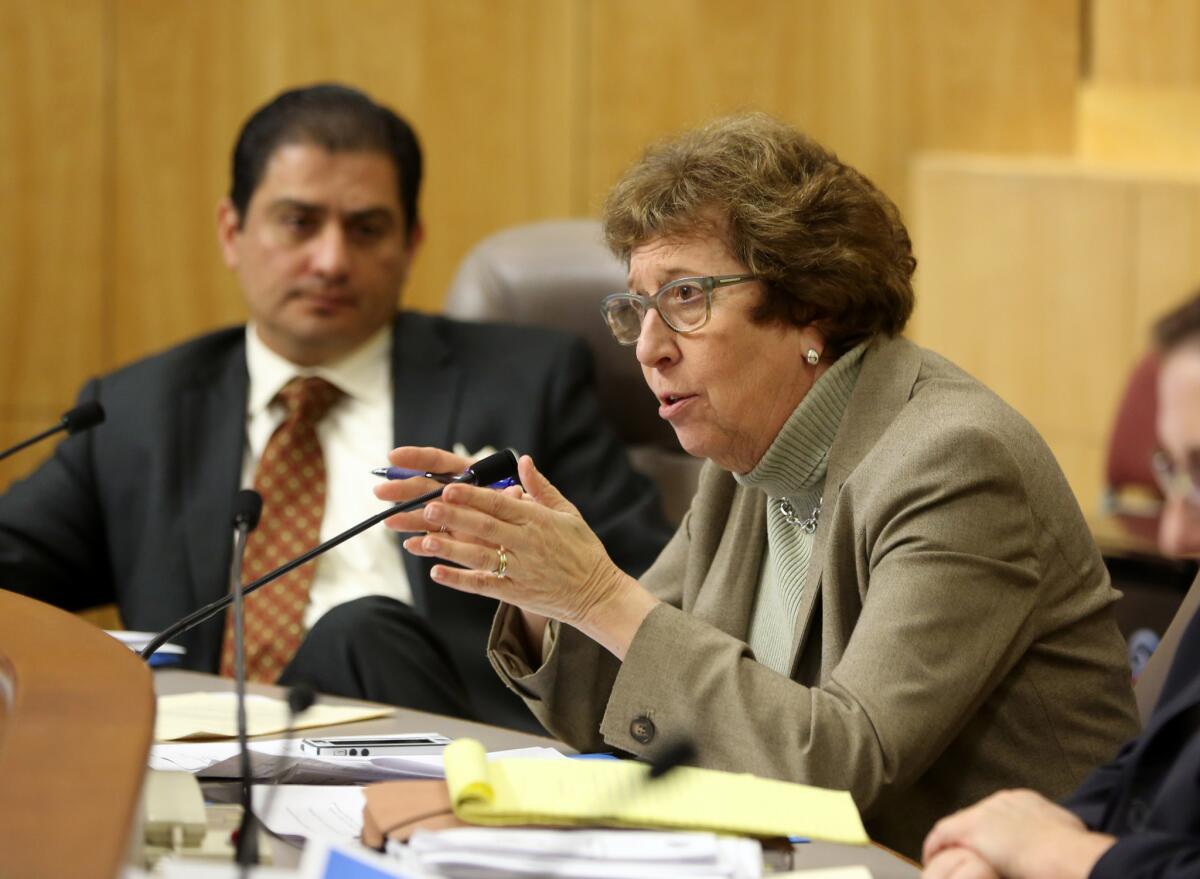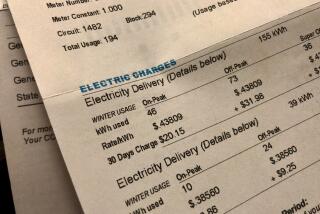Report: PUC needs tougher rules on contact between utilities, commissioners

Reporting from Sacramento -- — The former president of the Public Service Commission strong-armed a deal that forced a San Diego utility to buy more than $700 million in “costly and unneeded” power from a private generating company, state lawmakers were told Wednesday.
Senate testimony came from Kelly Foley, a former lawyer for an affiliate of San Diego Gas & Electric Co.’s parent, Sempra Energy. She recounted a 2003 conference call in which then-President Michael Peevey sketched out the power deal that eventually resulted in the purchase.
Buying the extra power constituted overkill, she argued.
SDG&E countered that the Otay Mesa output has proved “valuable” in meeting customers’ needs for reliable electric service. The company, said spokeswoman Jennifer Ramp, “made all appropriate filings” with the commission about meetings with regulators.
CalPine did not comment, and Peevey has been unreachable since retiring from he PUC at the end of last year.
Foley’s remarks came as the state Senate Energy, Utilities and Communications Committee heard testimony about deal making and improper contacts between the state’s utilities and power companies. A legislative staff report recommends restrictions and increased public disclosure of such meetings.
At issue in 2003 was a decision before the PUC to allow the sale by Sempra, of a power plant in Escondido to SDG&E. The hitch, though, was Peevey’s insistence that the utility also sign a contract to purchase electricity from another local power plant at Otay Mesa on the Mexican border, owned by CalPine Corp.
Administrative Law Judge Carol Brown, who participated in the conference call wrote the proposed decision sealing the deal. The controversial agreement won final approval on a 3-2 vote, with Peevey casting the deciding vote, Foley recalled.
“President Peevey ran the call,” Foley said. She noted that to her knowledge, neither the utilities nor the power companies filed any legally required notice “or any other public disclosure of the events of the conference call.”
Such notices of one-sided communication with commissioners and top staff are mandatory in many proceedings at the PUC. The purpose of filing what lawyers call “ex parte communications” is to ensure that all parties with a stake in a PUC decision, including utilities, ratepayers, environmentalists and community groups, get equal access to decision makers.
The need for tighter PUC control over improper communications is the central issue in an unfolding scandal at the powerful regulatory agency. The “backroom deals” and “overly cozy” contacts between utility brass and PUC bosses are the target of criminal investigations by the U.S. Department of Justice and the California Attorney General.
On Wednesday, the Senate committee held the second in three hearings on improper communications between utilities and regulators.
A report by committee staff outlined recommendations for the PUC to tighten its rules to make commissioners themselves publicly report any conversations with utility executives.
The new report comes in the aftermath of the release of tens of thousands of embarrassing emails and other accounts of chummy meetings, meals and contacts between utility executives and PUC commissioners and staff.
The state’s largest utility, Pacific Gas & Electric Co., has acknowledged that many of the released emails constituted improper communications that violated PUC rules.
Existing rules, designed to ensure equal treatment to all parties in a PUC legal proceeding, are loosely enforced or not enforced at all, said the report from the Senate panel said.
The committee staff’s principal findings are that the PUC’s rules for reporting contacts from parties in pending cases are out of line with the policies of similar federal and state regulatory agencies. What’s more, the PUC’s practices “are inconsistent with the quasi-judicial nature of most major proceedings.”
The committee recommends that such contacts be banned completely in many cases, including “adjudicatory, rate setting and rule making proceedings that are contested and rely on critical factual assumptions.”
The emails, which started dribbling out publicly last summer, show PG&E made efforts to influence the assignment of judges in cases involving alleged company negligence and a proposed $2-billion-plus fine against PG&E. The case followed the 2010 fatal gas pipeline explosion in the city of San Bruno.
UPDATE: 3:11 p.m.
Story is updated with information about a former Sempra lawyer telling a state Senate committee that former PUC President Peevey improperly intervened in a utility power purchase.
Twitter: @MarcLifsher
More to Read
Inside the business of entertainment
The Wide Shot brings you news, analysis and insights on everything from streaming wars to production — and what it all means for the future.
You may occasionally receive promotional content from the Los Angeles Times.











